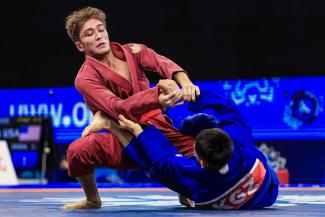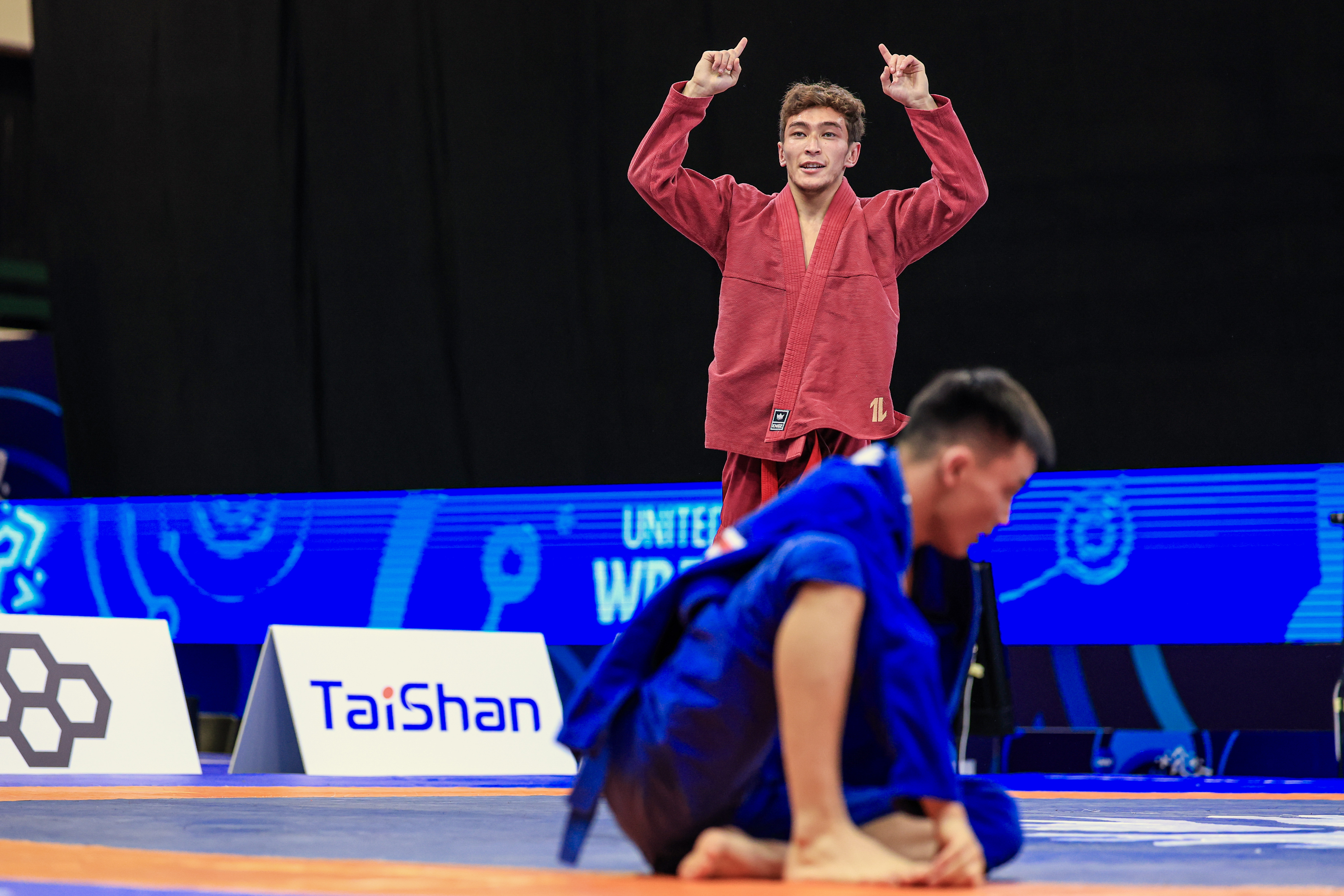Kawai makes stunning move to 68kg in bid for Olympic repeat
Friday, May 19, 2023 - 06:19 By Ken Marantz

TOKYO (May 16) -- In her bid for a second straight Olympic title, Yukako KAWAI has made a surprising and sudden move up two weight classes to the next Olympic division.
Kawai, who won the Tokyo Olympic gold at 62kg in women's wrestling, is entered at 68kg for next month's Meiji Cup All-Japan Invitational Championships, the Japan Wrestling Federation announced Wednesday.
The Meiji Cup on June 15-18 at Tokyo Metropolitan Gym is the second of Japan's two domestic qualifiers for this year's World Championships, which will provide the first opportunity for qualifying for the 2024 Paris Olympics. The first domestic qualifier was the Emperor's Cup All-Japan Championships held last December.
Kawai's older sister Risako (who now goes by her married name KINJO) has moved back down to 57kg, the weight class in which she won her second straight Olympic gold at the 2021 Tokyo Games. Risako had returned to competition at 59kg last fall after giving birth to her first child.
And the match-up that the wrestling world has been longing to see could finally become a reality at 53kg, where teen phenom and 2021 world champion Akari FUJINAMI and Tokyo Olympic gold medalist Mayu SHIDOCHI are both entered.
Any wrestler who wins titles at both the Emperor's Cup and Meiji Cup automatically earns a ticket to Belgrade. If the champions in the Olympic weights are different, a playoff will be held between the two in July. In non-Olympic weights, the two champions and any wrestlers who finish second in an Olympic division are eligible to enter the playoff.
The competition to get to Belgrade in the Olympic weights is particularly fierce, given that the Japan federation has decreed that a wrestler who wins a medal there will automatically fill the Olympic berth that comes with it.
While no medal is a sure thing, it is worth noting that Japan's women medaled in five of the six Olympic weights at the 2019 World Championships, the first qualifier for Tokyo 2021. As such, the top wrestlers have funneled into the Olympic weights for the Meiji Cup, pitting current and past world and Olympic champions and medalists against each other.
Kawai failed to win the 62kg title at the Emperor's Cup, revealing later she had not fully recovered from a back injury. While there have been no reports of her reason, it appears she figured her best chance for getting to Paris would be take a chance at 68kg.
It will be no easy task. While the weight class has seen the retirement of 2016 Rio Olympic champion Sara DOSHO, the field includes world silver medalist Ami ISHII, world 65kg champion Miwa MORIKAWA, world 72kg bronze medalist Masako FURUCHI and 2021 world silver medalist Rin MIYAJI.
Ishii, coming off a gold-medal run at the Asian Championships last month in Astana, has the upper hand, having defeated Morikawa 5-2 in the Emperor's Cup final. Miyaji gave Ishii a tough fight in the second round when she come out on the short end of a 6-4 decision.
Kinjo won the Emperor's Cup title at 59kg, so for her to make it to Belgrade at 57kg, she needs to beat in-form Emperor's Cup champion Sae NANJO in the Meiji Cup and/or a playoff. Nanjo was also one of Japan's five women's champions in Astana.
Not to be counted out is two-time world champion Tsugumi SAKURAI, who suffered a last-second 5-4 loss to Nanjo in the Emperor's Cup final and will be gunning for revenge.
Fujinami heads into the Meiji Cup on a 119-match winning streak dating back to her junior high school days, which she extened by winning three international titles in three months -- Zagreb in February, Sofia in March and Astana in April.
The streak currently ties her with legendary three-time Olympic champion and fellow Mie Prefecture native Saori YOSHIDA. But she has long said the streak is secondnary to winning a gold in Paris. Fujinami moved closer by cruising to victory at the Emperor's Cup, where Shidochi was in the other bracket but failed to make the final.
Shidochi had taken time off after the Tokyo Olympics to get married, returning to action last year to win her third world title at 55kg. But moving back to 53kg at the Emperor's Cup, she lost in the semifinals to former two-time world champion Haruna OKUNO, whom she had beaten in nine previous matches.
Also entered at 53kg is Moe KIYOOKA, the Emperor's Cup champion at 55kg who captured a world U20-U23 double in 2022 and won this year's Zagreb Open.
The most intense final could come at 62kg, where world 59kg bronze medalist Sakura MOTOKI will look to repeat her stunning triumph at the Emperor's Cup over world champion Nonoka OZAKI. That loss left Ozaki in tears and she will certainly be out for revenge.
Motoki, looking to join her father as an Olympian (Yasutoshi finished ninth at Greco 63kg at the 2000 Sydney Olympics), preceded her 4-2 victory in the final over Ozaki by crushing Kawai 9-2 in the semifinals. That gave the 21-year-old consecutive wins over the reigning Olympic and world champions.
At 50kg, standing in reigning world champion Yui SUSAKI's path to a possible second straight Olympic gold is longtime rival and 2021 world gold medalist Remina YOSHIMOTO. Susaki defeated Yoshimoto 8-0 in the Emperor's Cup final for her fourth win in four career meetings, but Yoshimoto always poses a threat for an upset.
The remaining Olympic weight class, 76kg, also presents a intriguing potential match-up. World U20 champion Ayano MORO, who just started her freshman year at Yamanashi Gakuin University, won the Emperor's Cup title when world bronze medalist Yuka KAGAMI wrestled injured and failed to make the final. It looks like a toss-up between those two.
Higuchi, Otoguro look to punch tickets to Belgrade
In men's freestyle, world 61kg champion Rei HIGUCHI will look to negotiate a tough field and earn the ticket to the worlds at 57kg, while Tokyo Olympic champion Takuto OTOGURO should have little problem locking up the spot at 65kg.
Higuchi, the 2016 Rio Olympic silver medalist at 57kg who failed to make Japan's team for the Tokyo Games, has been in sizzling form of late. Last year, he won Asian and world golds at 61kg before taking the Emperor's Cup title at 57kg to put him halfway to Belgrade.
Trying to keep him from making that trip will be Asian bronze medalist Rikuto ARAI, 2021 world 61kg bronze medalist Toshihiro HASEGAWA, 2019 Asian bronze medalist Yudai FUJITA and 2019 world junior champion Toshiya ABE.
Otoguro, the 2018 world champion, has only competed once since his Olympic triumph, and that ended with his third Emperor's Cup title and first in three years. His main competition will likely be Asian bronze medalist Ryoma ANRAKU, whom he beat 4-0 in the Emperor's Cup final.
The most intriguing freestyle weight class is 86kg, with veteran Sohsuke TAKATANI returning in an attempt to qualify for his fourth Olympics. The 34-year-old Takatani has spent the past two years at 92kg, where last year he won his 12th consecutive national title over four weight classes, while becoming the head coach at his alma mater Takushoku University.
Looking to stop him will be Emperor's Cup champion and Asian bronze medalist Hayato ISHIGURO and world U23 champion Tatsuya SHIRAI, who sat out of the Emperor's Cup.
In Greco-Roman, the weight class to watch is 67kg and Taishi NARIKUNI's quest to become a world champion in both styles. Narikuni won the freestyle 70kg crown last year in Belgrade.
Narikuni, who prefers weight training to typical wrestling practice, entered both freestyle and Greco at the Emperor's Cup (a title double hasn't been done in 49 years), but had to withdraw because of a broken rib suffered in practice. This time, he is entered only in Greco.
As for the reason for his unusual crusade, Narikuni's mother was a two-time world champion, and instead of just matching her, he feels his accomplishment will stand out more if he also wins two titles but in different styles.
Standing in his way are Emperor's Cup champion and Asian silver medalist Kyotaro SOGABE, 2022 Asian bronze medalist Katsuaki ENDO and Taishi HORIE, the Emperor's Cup winner at 72kg who has moved down to the Olympic weight.
At 77kg, Tokyo Olympic bronze medalist Shohei YABIKU has a steep climb to get back to Paris, having lost in the second round at the Emperor's Cup to world U23 bronze medalist Nao KUSAKA. Kodai SAKURABA, a bronze medalist at the recent Asian Championships, beat Kusaka in the Emperor's Cup final, and the title battle looks to be between these three.
For Olympic 60kg silver medalist and former world champion Kenichi FUMITA, the ticket to Belgrade is his to lose. He is the favorite to follow up his Emperor's Cup triumph.


 Alikhan ALSHINBAY (KAZ) celebrates after winning the 58kg final in Grappling Gi. (Photo: United World Wrestling / Amirreza Aliasgari)
Alikhan ALSHINBAY (KAZ) celebrates after winning the 58kg final in Grappling Gi. (Photo: United World Wrestling / Amirreza Aliasgari)
Share your thoughts.
Comments